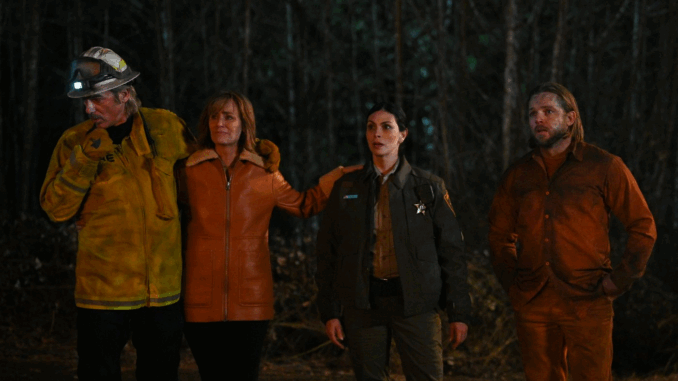
‘Fire Country’ Reveals Startling New Details About How Vince Died After Billy Burke’s Shocking Exit
Fans of Fire Country were left reeling after the sudden departure of Billy Burke, who played the beloved character Vince. But the show didn’t leave fans in the dark—startling new details about Vince’s death have emerged, offering clarity and shocking twists that will leave viewers on the edge of their seats. In this article, we’ll break down everything you need to know about Vince’s exit, the storyline impact, and how Fire Country is moving forward without Billy Burke.
Billy Burke’s Sudden Exit Shocks Fans
Billy Burke’s exit was not just unexpected—it was heart-wrenching. Fans quickly turned to social media to express disbelief:
-
Many shared emotional tributes to Vince
-
Discussions about the storyline’s impact trended online
-
The suddenness of the departure left questions about the show’s future
Vince’s Character Arc in Fire Country
Before diving into his death, it’s important to understand Vince’s journey:
-
Vince was a central figure, known for bravery and loyalty
-
His relationships with other firefighters drove many emotional storylines
-
Fans connected deeply with his character, making his death even more impactful
The Episode That Changed Everything
The episode revealing Vince’s death dropped jaw-dropping details:
-
Vince was involved in a high-stakes firefighting mission
-
A tragic twist during the rescue operation led to his fatal injury
-
The show emphasized the emotional toll on his teammates
How Vince Died: New Details Revealed
Fire Country has been deliberate in revealing the circumstances:
-
Vince sustained life-threatening injuries during a fire incident
-
Despite heroic efforts, medical intervention was unsuccessful
-
The show highlighted realistic firefighting dangers, adding authenticity
The Emotional Fallout for the Team
Vince’s death had immediate repercussions:
-
Characters like Billy Burke’s on-screen colleagues faced grief and guilt
-
Emotional dialogues and scenes depicted the raw impact of losing a teammate
-
Fans praised the show for balancing shock with genuine emotion
Fan Reactions to Vince’s Death
Social media exploded after the reveal:
-
Hashtags like #RIPVince and #FireCountry trending worldwide
-
Fans expressed sadness but also admiration for the storyline’s intensity
-
Speculation about future episodes surged, keeping audience engagement high
How the Writers Crafted Vince’s Exit
The creative team behind Fire Country crafted a careful storyline:
-
Writers aimed to honor Vince’s heroism while creating a dramatic pivot
-
They left clues and foreshadowing in earlier episodes
-
The storyline ensured Vince’s death had narrative purpose, not shock value alone
Billy Burke Speaks About Leaving the Show
After the episode aired, Billy Burke shared insights about his exit:
-
Emphasized gratitude for fans and colleagues
-
Explained personal and professional reasons behind leaving
-
Encouraged viewers to continue supporting Fire Country
The Role of Realism in Fire Country’s Storytelling
Fire Country has always aimed for authenticity:
-
Firefighting risks and consequences are depicted realistically
-
Vince’s death illustrates the high stakes and emotional burden firefighters face
-
This approach resonates with viewers and adds depth to the narrative
Impact on Future Storylines
Vince’s death isn’t just a single event—it sets the stage for new plotlines:
-
Characters must navigate grief and responsibility
-
Leadership dynamics in the firehouse will shift
-
New characters may be introduced to fill the void
Comparisons to Other Firefighting Dramas
Vince’s exit has drawn comparisons to similar shows:
-
Like 9-1-1 or Chicago Fire, character deaths can dramatically reshape storylines
-
Fire Country distinguishes itself by blending personal and professional consequences
-
Fans appreciate the balance of realism and emotional storytelling
The Emotional Impact on Viewers
Vince’s death was designed to evoke strong emotions:
-
Some viewers reported tearful reactions
-
Emotional investment underscores the show’s success in character development
-
Fans praised the storytelling for being heartfelt rather than gratuitous
Lessons From Vince’s Departure
Beyond shock value, Vince’s death teaches several lessons:
-
Life is unpredictable, especially in high-risk professions
-
Strong bonds among teammates are central to resilience
-
Heroism often comes with sacrifice
What Fans Can Expect Next
The aftermath of Vince’s death will shape future episodes:
-
Storylines will explore grief, teamwork, and rebuilding
-
New characters may challenge existing dynamics
-
Emotional arcs will remain a core focus of the series
The Legacy of Billy Burke’s Vince
Even though Vince is gone, his impact endures:
-
His heroism continues to inspire other characters
-
Fans will remember Vince’s courage and loyalty
-
His presence will influence storylines through memories and references
Conclusion: A Bold Move for Fire Country
The shocking revelation of Vince’s death following Billy Burke’s exit demonstrates Fire Country’s commitment to high-stakes storytelling and emotional realism. While fans mourn the loss, the show’s dedication to authenticity ensures Vince’s legacy resonates, shaping the series for seasons to come.
FAQs About Vince’s Death and Billy Burke’s Exit
Q1: How did Vince die in Fire Country?
A1: Vince sustained fatal injuries during a high-risk firefighting mission, highlighting the dangers of his profession.
Q2: Why did Billy Burke leave Fire Country?
A2: Billy Burke cited personal and professional reasons for his departure while expressing gratitude to fans and colleagues.
Q3: How are other characters reacting to Vince’s death?
A3: The team experiences grief, guilt, and emotional struggles, with the storyline exploring realistic emotional fallout.
Q4: Will Vince appear again in any form?
A4: While Vince is gone, flashbacks, memories, and references may continue to influence storylines.
Q5: How does Vince’s death affect Fire Country’s future plotlines?
A5: It shifts leadership dynamics, introduces new emotional arcs, and sets the stage for new characters and storylines.
